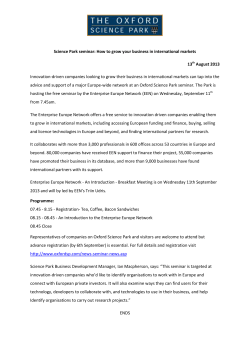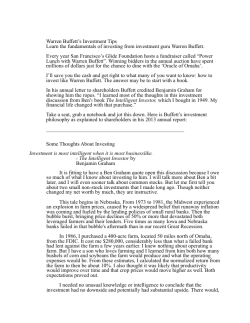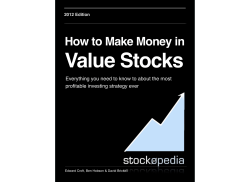
How to Avoid the 7 Most Common Investor Mistakes
How to Avoid the 7 Most Common Investor Mistakes The Oxford Club 105 W. Monument St. Baltimore, MD 21201 410.223.2643 800.992.0205 And Build Steady Profits No Matter What the Markets Do White Paper • Volume: 0204 • Series: K • No. 33 Table of Contents How to Aviod the 7 Most Common Investor Mistakes And Build Steady Profits No Matter What the Markets Do Introduction ........................................................................................................1 Mistake #1: Following the "Saturday Morning Hero" Will Lead to the Promised Land of Investing..................................................................3 Mistake #2: A Few Weeks Is Long Enough to Wait for Huge Profits ........4 Mistake #3: You Should Only Buy Soaring Stocks, Using "Insider Knowledge" ........................................................................................5 Mistake # 4: Wall Street’s Wizards Will Hit Home Runs for You ..............7 Mistake # 5: There’s Always Another Tech Run-Up Just Around the Corner ....................................................................................9 Mistake # 6: If You Listen to Enough Televised Investing Reports, You’ll Learn Something Profitable ................................................................11 Mistake #7: Watching the Markets and Predicting Them Is the Key to High Returns ........................................................................................12 About Steve McDonald....................................................................................16 INTRODUCTION From: Steve McDonald, Director of VIP Services To: Oxford Club Members One of the most least understood truths of investing is this: Success in the game of investing depends more on not making mistakes than it does on picking big winners. Period. Of course, finding a neglected small-cap stock and riding it to the stratosphere is exhilarating. And nothing compares to the pure satisfaction of the hunt. But, as anyone who’s been around the financial markets for a long time will tell you, it just doesn’t happen very often. The real pros understand that success comes from sidestepping the traps—specifically, the Mistakes that lure the unwary investor into unrecoverable disasters. Day in and day out, these pros follow a disciplined approach. They’re not swayed by talking heads and self-appointed market pundits who babble on about the next big thing. They’re confident in their ability to stay out of trouble and ride through the rough spots as they wait for the next good opportunity. This special report will help give you that same confidence by dispelling some of the myths that derail most investors at some point—but that can be easily avoided. In case you’re new to The Oxford Club, VIP Trading Services is a group of highly experienced brokers, traders and analysts who have worked in the market for years—including myself. We’re here to assist you with your questions and concerns about the five premier trading services the Club offers: The Oxford Short Alert, Momentum Stock Alert, Insider Alert, The Income Trader and Options Advantage. We in VIP Trading Services cannot give you individual trading advice. We can, however, give you the direction and support you 1 need to improve your investment returns, as well as make the most out of your membership. With this in mind, it’s more important than ever to take a look at what I call the "Seven Deadly Sins of Investing." These common misapprehensions will erode your profits and leach away your hard-earned capital. In addition, we’ll show you a proven, time-tested approach to avoiding each and every one of them. At The Oxford Club, our only objective is to help you—and all of our members—prosper. You won’t find any conflicts of interest here. We’re not selling you stocks, bonds or other investments. Our only hope is that this special report will go a long way to ensure that your money continues to grow safely. Steve McDonald, Director Oxford Club VIP Trading Services 2 Mistake #1: Following the "Saturday Morning Hero" Will Lead to the Promised Land of Investing Is there anything more exciting than a great pass that wins the game in the last few minutes of Friday night’s big football rivalry? "The Saturday Morning Hero" is the star of the week. Unfortunately, in another week that star is completely forgotten. In the investment business it’s pretty much the same game. Anyone remember Elaine Garzarelli? How about Michael Milkin? There was a time when a public sighting of either one of them would start a stampede. Not so anymore. Sometimes, Money Managers Really Are Just Lucky—Once Elaine Garzarelli was right about one thing, once: She happened to luck out and predict the 1987 crash. That was probably her last correct call. But she was hot for a while. She had her own radio and TV show, she was quoted by everyone, and as far as we can remember she was consistently wrong. She’s one of those Saturday Morning Heroes. A lucky catch catapulted her into investing stardom. But it wouldn’t last long. Mr. Milkin, at one time (before he went to jail), was the "Bond God." Remember the RJR buyout, and just about every other buyout of the ‘80s? Mr. Milkin was behind most of that business. He created a whole new idea in investing: Junk bonds. And folks stood in line to buy them . . . until they began living up to their name. After his bonds blew up, Milkin went from being a Saturday Morning Hero to Sunday Morning’s Goat—and served some hard time as a result. The bad news in all of this is that the average investor is usually the first in line to follow the Saturday Morning Hero. We love heroes. And the biggest danger in hero worship is backing our star long after his time to shine has ended. When investing, it costs us money to follow a hero whose day has passed. 3 Most of us find it difficult to buy into a system and stay with it. We’re always looking elsewhere trying to find the latest and the greatest. This is the beginning of what have proven to be very costly moves for a lot of investors. By the time you discover it’s the latest and greatest, it turns out to be just another Saturday Morning Hero. As you move from service to service, or fund to fund, you begin to develop "Investing Scars." Each time you realize the most recent service isn’t the answer to all your dreams, you blame the service or the manager. The fact is you were probably chasing past performance and got in at the worst possible time. We have all done this. It has a cumulative affect and, at some point, the scarred individual just quits. The answer to this dilemma is simple, but there may be no tougher thing to do than to choose an investment or trading service and stick with it through a tough period in the market. 4 The best approach is to give your investments time to work. This takes practice and discipline. Most investors never have these qualities, but you can develop them with the help of VIP Trading Services. With these powerful tools, you can make time serve you and your profits. Mistake #2: A Few Weeks Is Long Enough to Wait for Huge Profits Mark Twain once told a fabulous story about a 17-yearold kid who leaves home and returns eight years later—only to be stunned by how much smarter his father has become! If you’re under the age of 25, you might not get the message above. For the rest of us it’s a funny reminder of how the passage of time affects everything in our lives— including our investment choices. In investing, one principle always rings true: Time is the single most important element of investing. And for that reason, mismanaging time can have the most devastating effect on your money. Expand Your Time Horizons Ridiculous as it may sound, the average investor has a time horizon of between two and six weeks. This means that if an investment doesn’t start to go the way the investor thinks it should—within about a month— the investor gets antsy and usually gets out. This is the most obvious and most common misuse of time. Of course, there’s an important difference here between trading and investing. Traders exchange a much higher degree of risk for this much shorter time frame. In fact, every measure of investing is tied to some element of time. Running averages, charting, entry and exit points and so on. Many experienced brokers say a three-year time frame is a good perspective to use when making a decision to buy a stock. At the very minimum, you should look at the 52-week trading range. For mutual funds the recommended minimum holding time is three to five years. Mistake #3: You Should Only Buy Soaring Stocks, Using "Insider Knowledge" "I bought this supposedly hot stock and it dipped right after I got in!" If there were ever a universal investor complaint, that’s it. So what’s happening here? To begin, we need to think about why and when we invest in a stock. When: If you’re like most people, you wait for the price of a stock to increase to such a point that you are convinced it’s a good investment. Why: Let’s start with an example. You have a friend, whose brother works for a guy . . . who owns a company that does business with a company . . . whose sales rep said the company is making money hand over fist. Based on this "direct" feed to the inside, we take our hard-earned money and buy stock in this company. But by the time we hear about it, the price has usually run up far beyond a reasonable buy range, and in effect we’ve 5 just paid a commission to give our money to someone else. Mingled together, a wrong "why" and a wrong "when" can have some pretty strange results. What often happens next is right out of a bad joke. An otherwise normal, rational person becomes glued to MSNBC and the quote section of AOL. He spends every free moment watching this dog to see when—not if, but when— it’s going to "take off." As the obsession grows the investor spends more and more time watching the stock price, almost as if that alone will make the price go up. He may even call the person who gave him the tip—and almost always will call the broker who placed the order for him. The investor believes the broker should have known better, the friend is an idiot, and he or she is really upset about the situation. This is "market timing" in the worst sense, and it can only lead to losing money. Other things sabotage us, too, such as: • Having an unrealistic concept of the market. 6 Many Americans see the market as something exciting that makes people rich. • We don’t understand how to get in or out of the market (although this has improved immensely in the past few years with online investing). • We have no idea how all the information that we are bombarded with relates to the market or even to individual stocks and their movement. • Last but not least, despite all the unknowns, we decide we can do it ourselves. Overcoming Your Fear of the Investment Unknown In addition to the aura of excitement and wealth surrounding the market, deep down, many folks are afraid of it. It’s something few of us know much about. As a way of overcoming our fear of the investing unknown, we watch and monitor until we are convinced that investing works. We watch stocks go up in value until our fear of the market has been momentarily eased, and then we jump in headfirst. The result is always the same. We pay too much for the stock, since we watched it go up, and it immediately starts to sell off to profit takers, or we get into something that never does anything. If we buy at the top and sell when it slides, we can only lose. It’s good for your taxes and nothing else. Be Emotionless: The Key to Profitable Investing When to buy and when to sell are only two of the tough questions you must be able to answer if you are going to invest successfully. Doing both without allowing fear or any other emotion to get in the way is what separates the pros from the rookies. Why do we pay too much for stocks? It’s because our fear keeps us from buying when it’s smart to do so. The Oxford Club’s trading services will tell you when to buy, at what price and when to sell. The entire approach is designed to take the guesswork and the often gut-wrenching emotional decision-making out of the process. Even if you’re a rookie, you’ll be trading like a pro and booking steady profits. Mistake # 4: Wall Street’s Wizards Will Hit Home Runs for You Remember when Chicago Cubs slugger Sammy Sosa was suspended for using a corked bat? Why did he do it? Obviously because he could swing a corked bat faster, thus sending the ball farther. Plus, he thought he could get away with it. Fans pay to see Sosa hit homeruns. That’s certainly what we expect him to do, too. Sosa felt the pressure. Wall Street’s high-powered marketing mavens are using their own versions of corked bats to peddle high-flying tech stocks set to "go to the moon." Or swamp-dwelling "value dogs" that are supposedly set for a big move. All we have to do is get out our wallets. And too many investors do it over and over again. That’s exactly what the aggressive brokers on Wall Street are counting on when they try to sell us their getrich-quick stock picks (make 7 10,532% profits overnight!), or currency plays that will "change our lives forever." Virtuoso Button Pushers You see, those brokers are smart. They know what pushes our emotional buttons. But we don’t have to invest emotionally in things that ultimately might harm our portfolios. Instead, we can insulate ourselves from the Wall Street sales machine by following a sound, non-emotional investment strategy. How does Wall Street use your unrealistic expectations to fleece you? It simply offers mutual funds with hyped-up returns. Annuities that claim outrageous guaranteed returns. IPOs for tech stocks with wild, impossible expectations. Or biotech stocks with incomprehensible science behind them. It isn’t hard to figure out what the average investor expects. He wants guaranteed investments that will return 400 to 500% per year. This is the reality of the small or novice investor. They usually won’t admit this, but it’s very close to the truth. 8 Wall Street, for all its failings, is not staffed with stupid people. In fact, they are as sharp as people get. What they do best is figure out ways to get your money into their pockets. The Danger of Wanting to Believe When the media finally started publishing information about how investors were lied to and cheated during the big runup in the market in the 1990s, there were a lot of angry "reformers" on the warpath. The fact is, not one of the scams, not one phony research report, not one inflated IPO or dot.com could have ever seen the light of day if there weren’t investors who wanted to believe in them. When the next Wall Street scandal hits the papers—and it will—think for a moment about how realistic the expectations were that allowed it to come to life. Hit for Singles and Doubles Investing is a game of averages, not homeruns. Success depends on hard work and a disciplined investment strategy that includes: • Asset Allocation—making sure that no matter which way the market goes, you profit by having your investment dollars in noncorrelated asset classes • Position Sizing—ensuring that you never suffer a catastrophic loss, by limiting the amount of your investment dollars in any single position • An Exit Strategy—giving you the ability to minimize your loses and let your winners run, such as The Oxford Club’s 25% trailing stop system • Recommendations from qualified, independent sources—This ensures that the investment advice you receive is never compromised by brokers who need to satisfy their investment-banking clients—instead of making the best choices for you. For more free information on asset allocation, position sizing or exit strategies, visit our web site at www.oxfordclub.com. Click on "Special Investor Briefings" and download both of the following reports: "How to Become a Millionaire 2.4 Times Faster" (which deals with asset allocation) and "The Two Most Profitable Secrets of the World’s Greatest Investors" (for trailing stops and position sizing). Once you have all of this in place, you’ll never again lose money due to unrealistic expectations. Mistake # 5: There’s Always Another Tech Run-Up Just Around the Corner At this writing, the market has made a big move, shaking off some of the bear doldrums of the recent past. Interestingly, the tech sector stocks—the same ones that lost investors so much money the last time around—are back in the saddle with big gains. So why are people jumping back into the same stocks that wiped them out just a few years ago? And an even better question is this: Should you follow them in or develop the discipline to tell a solid investment from solid waste? Here’s your answer: 9 But apparently time has No Earnings, No Products, healed many of them . . . or a No Dice These tech companies, for the most part, have no earnings, inexperienced management (or just bad management) and a proven record of getting in debt way over their heads. Despite all this, despite their record of turning wealth into thin air, investors are standing in line to own them . . . again! When the telecom, Internet, chip manufacturers and computer stocks were in the midst of their crazy rally of the late 1990s, most experienced investors knew enough not to get overloaded in them. It didn’t take an Alan Greenspan to know that we had to have a really bad crash if the market was running up so high, so quickly. It also doesn’t take a genius to know that companies with no product or earnings, and with kids running the show, don’t last long. Before the latest tech runup, you would have been hard pressed to find anybody in the world who would have ventured into the tech sector. The wounds from the crash were still very real. 10 lot of investors have forgotten how they got hurt before. If you’re in this group, here’s a reminder: Entire fortunes were wiped out because investors were led to believe that these fastgrowing companies—the tech sector in particular—had no top. These babies would go to the sky and then some. It was the digital-information age, and we were leading the world to limitless new heights. It’s Déjà Vu All Over Again But things are better now, right? Well, not exactly. After several years of corporate scandals, indictments, sweeping changes in the SEC and tougher enforcement of the existing laws to protect investors, we’re actually right back where we were when tech stocks looked like the deal of the century. The picture is already forming, and investors are again being set up like bowling pins, and knocked down again. Apparently, too many of us learned nothing. We still want to believe that we can make a quick buck in the market by taking crazy risks with our money. So that begs the $64,000 question: Will it happen again? Could we get ourselves in the same pickle we had been in for the last three years of the killer bear market? As a matter of fact, this looming disaster is entirely unavoidable. The Secret to Avoiding the Unavoidable Here at The Oxford Club, including within our VIP Trading Services group, we give our members unbiased, realistic information. We have no reason to recommend anything except to increase the wealth of our members. We don’t get commissions based on the number of stocks you buy and sell. We aren’t motivated by an investment-banking arm to foist stocks upon members. Simply put, we try to instill something more important in our members: a disciplined investment system. The difference between our members and the regular investors who are lining up for the next slaughter is discipline. And discipline begins with becoming a more knowledgeable investor. Wall Street can’t victimize an informed investor. Disciplined investors don’t load up on tech stocks. They don’t chase stock prices. They ignore the latest and greatest deal. They ask the right questions, and they consciously avoid letting their gut or their emotions get in the way of intelligent investing decisions. The Oxford Club’s trading services, exit strategies and portfolio recommendations from the Communiqué can give you the professional edge you need to be a successful investor. We can help you remove emotion from your investment decisions. But you must make the decision to stick with the program. Mistake # 6: If You Listen to Enough Televised Investing Reports, You’ll Learn Something Profitable About anyone who knows a stock from a bond can enjoy the televised financial reports that run daily in the media. Problem is, they provide just enough information to make them dangerous to your wealth. 11 Most commentators have no professional experience in the financial markets. In addition, they essentially read scripts written by people who may have no, or little, professional experience in investing. The worst part is that most of what you hear in the media about the markets is not wrong—it’s just incomplete. At best, you’re getting less than 1/100 of the information you need to make a decision. And this creates the most dangerous situation of all: a false sense of knowledge. The average person watches this slurry of earnings information, opinions, biased positions from the featured talking heads, gold prices, crude oil prices, the Greenspan watch, the yen, the euro, you name it. And some actually try to manage their money with the crumbs of information they glean from these shows. Bottom line, investing is serious business. It is not about personalities in expensive suits, styled hair or even the pretty young women reading scripts in front of pictures of the CBOT. It is about getting solid, actionable information from reliable 12 sources and putting that information to use. In terms of the mainstream media, we recommend that you stick with the Wall Street Journal and Investor’s Business Daily. But The Oxford Club is your best investing information source. Along with the many resources mentioned in this special report, you can go to www.oxfordclub.com and click on the "Advisors and Partners" section to access the Club’s network of Pillar One Partners, including planners, advisors and discounted brokerage services. Mistake #7: Watching the Markets and Predicting Them Is the Key to High Returns Smart investors are more interested in making money, not in what the markets are doing. Of course, if you invest in the indexes (DJIA, Nasdaq, etc.) then you need to follow them. However, if you are invested in companies, look at the companies, not the indexes. You can make money by investing in stocks that go up in price when the market is up, when the market is down, or when the market is flat. In this light, the answer to "What’s the market going to do?" couldn’t be less important when it comes to your portfolio. Understandably, we have been led to believe, by television for the most part, that the DJIA is the end-all, be-all of the stock market. And in the last few years the Nasdaq’s performance was considered all-important. The fact is our fascination with the major indexes is one of the reasons many people get into the market too late. They think, or expect, the market index to be an indicator of when it’s a safe bet to invest. They’re wrong. The Reality and Myth of "the Run" Consider the Nasdaq during the so-called bull market of the late ‘90s. The lowly Nasdaq ran from a meager 1,200 to 5,000 in about four years. That’s about 400%. The average Joe turned on his TV at night and heard this and assumed people who invested in the stocks on the Nasdaq were making a lot of money. What Joe didn’t (and still doesn’t) know is that 97% of the increase in the Nasdaq was the result of three stocks. The Nasdaq has 100 stocks and uses a market-weighted system to arrive at its average value. What’s "marketweighted" mean? It means that if a stock represents a greater percentage of the total value of all of the outstanding shares on the Nasdaq, it will have a greater impact on the movement of the entire index. In other words, the larger a company’s "float" (number of shares on the market) and the higher its stock price, the more it drives the average. So, in the mid-1990s there were three major Nasdaq stocks: Intel, Microsoft and Dell. They had a huge number of outstanding shares. And their shares were skyrocketing, for good reasons: sales and profits. The result is that they accounted for 97% of the yearly growth of the index. The average growth of the remaining stocks on the Nasdaq for the late ‘90s was 3% per year. How about the Dow Jones? The DJIA is an average of 30 stocks. It was originally designed to be an indicator of the results of industrial produc13 tion. In case you haven’t noticed, we are not into industrial output anymore. Still, everyday, all day, it’s what most people think of when they think of the market. There are about 14,000 stocks listed on the NYSE and Nasdaq. Ever wonder what the other 12,970 are doing? There is a good use for the indexes. But they are used in conjunction with the other thousands of indexes, trend lines, fundamental data, technical data, etc. They are never the only indicators to be considered when you’re buying or selling stocks. During the three years of the bear market, The Oxford Club VIP Trading Services managed to eke out small gains or break even. We would have loved to have made money every year. But considering the markets were down as much as 20% in 2002, breaking even looked pretty good. Unfortunately, too many members wouldn’t take advantage of the recommendations they were paying for that could have worked for them. Why? Because the Dow and Nasdaq were down and that scared them off. 14 When Mainstream Media Calls the Shots . . . Run the Other Way, Fast Here’s how you do it. Wait until the TV talking heads are saying we are in a recession; the market is going to drop like a rock, and they are predicting doom and gloom. At that point, stocks will be ready to go through the roof. When TV figures out that stocks are in trouble, it’s time to buy. So, what’s the market going to do? It’s going to go up. Long term the market goes up. What you want to know is, "Will it go up within a certain time period after I put my money in?" Yes, but only if you stick with the tried and true methods, give it time to work, and use reliable information sources. By doing these simple things, you are doing everything you can to maximize your chances. The VIP Trading Services team is available at 888.570.9830 to help you get the most from your Oxford Club membership. Depend on Your Oxford Club Support Network You should make every possible attempt to attend a local Oxford Club chapter meeting. Here’s where you’ll see the Club’s motto, "Great Profits in the Company of Good Friends," really come to life. Since the creation of our VIP Trading Services group, we’ve traveled throughout North America, speaking at local chapter meetings and getting the word out on our unique investment systems. One of the most popular topics for discussion at the chapter meetings deals with the Club’s fast-paced trading services. Here’s our short list of "Don’ts" when you’re trading for short-term profits. If you want to make money, avoid: • Cherry Picking: Subscribing to a service and choosing just one of the recommendations based on your gut. • Elephant Hunting: Loading up on a single investment to a point where you are way overweighted. A well-worn recipe for disaster! • Keyhole Perspective: Trying to make a decision about the worth of an investment or service based on a small amount of information. • An "Only Winners" expectation: Believing at some level that if you look long enough or switch services often enough you won't have any losers. Losers are part of the game, ergo diversification, balancing amounts invested, etc. • Gut Selection: If your gut has been wrong in the past, chances are it's not going to change. If you’re guilty of any of these "shortcuts," perhaps you should make time to attend the next chapter meeting close to you. For information on chapter meetings, consult the most recent issue of the Communiqué (also available online at www.oxfordclub.com). Imagine Your Own Wealthy, Extended Family The most rewarding benefits of membership in The Oxford Club can be the relationships that you can build with fellow members and advisory panelists. Sure, 15 making money through investing is fun, but doing so with a group of people who are all profiting together makes it that much more enjoyable. yesterday I had the first one stop out. You have, potentially, saved me a lot of money. I wish I had done this sooner." These personal relationships have led us to unique opportunities to profit. Listen to the firsthand experience of some of our members: "I should write more often to tell you how well our investments are doing, thanks to your advice. Stocks are up over 24%. The funds, etc. are up over 22%. I keep telling my wife how well I’m doing in the stock market. I must admit, she knows you guys get a lot of the credit." "I’m calling to thank you. My portfolio, thanks to The Oxford Club, is up over 22% year to date, and up over 252% over the last 12 months. Keep up the good work." ~Edward B., Pembroke Pines, FL "The reason I joined [The Oxford Club] was that I learned some things just by reading your invitation—the trailing stop concept was of particular interest to me. I recently put trailing stops on my stocks and ~Mark M., Flower Mound, TX ~Ernie H., Fair Oaks, CA If you don’t attend these chapter meetings, you could be missing your best chances to make the kind of connections that could make you seriously rich. Check out the next chapter meeting nearest you and do your best to attend. About Steve McDonald Steve McDonald, Director of VIP Trading Services for The Oxford Club, oversees fulfillment and member satisfaction for The Oxford Short Alert, Momentum Alert, Insider Alert, The Income Trader and Options Advantage. For 10 years Steve was a professional broker with a prestigious Baltimorebased, full-service brokerage where he specialized in helping retired and semi-retired investors create and preserve wealth. His work with the elderly was recognized by his firm when he was selected as a representative to the Clinton Administration’s Council on Aging. In addition, on an annual basis, Steve was selected to lead 40 investment-focused workshops for conservative/retired investors. Before entering the investment industry, Steve spent eight years in the U.S. Navy as an aviator. 16 Copyright 2004, The Oxford Club, LLC, 105 W. Monument Street, Baltimore, MD 21201. Phone: 410.223.2643. All rights reserved. No part of this report may be reproduced or placed on any electronic medium without written permission from the publisher. Information contained herein is obtained from sources believed to be reliable, but its accuracy cannot be guaranteed. The Oxford Club provides its members with unique opportunities to build and protect wealth, globally, under all market conditions. The executive staff, research department and editors who contribute to the Club’s recommendations are proud of the reputation The Oxford Club has built since its inception in 1984. We believe the advice presented to its members in our published resources and at our meetings and seminars is the best and most useful available to global investors today. The recommendations and analysis presented to members is for the exclusive use of members. Copying or disseminating any information published by The Oxford Club, electronic or otherwise is strictly prohibited. Members should be aware that investment markets have inherent risks and there can be no guarantee of future profits. Likewise, past performance does not assure future results. Recommendations are subject to change at any time and so members are encouraged to make regular use of The Oxford Insight, the members-only website, The Oxford Club’s telephone hotline and pay special attention to the “What to do With Your Money Today” section of the Communiqu´e to get the most value from our investment analysis. PRIVACY NOTICE You and your family are entitled to review and act on any recommendations made in this document. All Oxford Club publications are protected by copyright. No part of this report may be reproduced by any means (including facsimile) without written permission from the publisher. Information contained herein is obtained from sources believed to be reliable, but its accuracy cannot be guaranteed. The company, its officers, directors, employees and associated individuals may own or have positions in recommended securities and may add or dispose of the same. Investments should be made only after consulting with your investment adviser and reviewing the prospectus or financial statements of the company. THE OXFORD CLUB 105 West Monument Street • Baltimore, MD 21201 Tel: 410.223.2643 • Fax: 410.223.2650 KWP0204-33 300CR0179
© Copyright 2025












